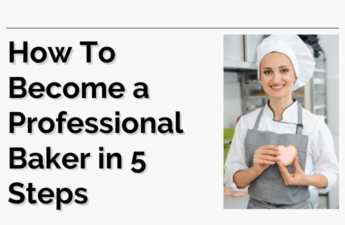How to become a professional baker
From crusty bread and croissants to more intricate confections like macarons and kouign-amann, baked products come in a variety of shapes and sizes. Bakery work conditions can be equally as varied, giving this a versatile career path with a wide range of alternatives. The wage of a baker is determined by their number of years of experience, location, workplace, industry, and position. Specialty bakers, for example, often produce more than industrial bakers.
Earning a certification from Baking school in Delhi can help you make a positive impression on future employers by demonstrating that you have the necessary knowledge and abilities to work in a bakery. In this post, we’ll go over how to become a professional baker, as well as the education, certifications, abilities, and experience you’ll need to get started.
To become a baker, you’ll need a combination of experience and education, depending on your goals.
To pursue a profession as a baker, follow these five steps:
1. Finish high school or equivalent
If you desire to enrol in a baking school. These colleges require 10+2, which means you must complete high school in order to understand the fundamentals of the professional degree.
While you don’t need a diploma to work as a baker, most vocational schools will need you to have the equivalent of a high school diploma before you can begin a culinary or pastry programme. Furthermore, if your high school offers an elective that allows you to gain exposure to baking or nutrition, take advantage of it to begin developing your talents.
2. Consider attending a culinary or technical school
Even if you’ve mastered your own recipes, a culinary, technical school Baking school in Delhi can offer you vital skills to help you enhance your baking abilities and hone your art. Nutrition and health, various cuisines, proper culinary methods, kitchen management, and recipe computations are all included in the courses. Attending culinary or technical school is not essential, however, it may assist you in developing more advanced culinary skills.
Sign up for a proper course, which can be either short or long term depending on your budget and time constraints. You can take hotel management courses at both private and public universities. Those interested in starting their own bakery should consider getting an associate’s degree in baking and pastry arts.
Depending on the depth of the programme and whether you attend full- or part-time, a culinary or technical school degree typically takes one to two years to finish.
3. Gain experience as an apprentice or baker’s assistant
It’s always better to work as an apprentice or as a baker’s assistant to get experience.
Working at a local bakery as an apprentice, trainee, or helper can give you significant industry experience. You can learn safe food handling, hygiene, and other basic baking techniques by working under a baker for one to three years.
Working as an apprentice or assistant baker allows you to form ties with other bakers, which might help you obtain a job as a professional baker later on.
4. Choose a speciality
Find out what type of baking you are most interested in after you have had some experience baking from Baking school in Delhi. Depending on the course you take, you may need to acquire specialized skills. Plant bakers, for example, may use high-volume industrial tools and ovens that require specialised training to operate properly. Here are a few popular baking specialities to get you started:
baker for commercial service
These bakers labour in factories and use machinery to mass-produce baked goods for retail outlets.
Baker in a retailing context
These bakers manufacture smaller quantities of baked items for clients in grocery stores, speciality shops, and bakeries. Some retail bakers own their own bakeries and are in charge of staffing and inventory management.
Pastry Chef
Pastry chefs, often known as patissiers, operate in a professional kitchen and are often in charge of the dessert menu. They frequently create and select recipes, as well as supervise all aspects of the pastry kitchen.
Baker of artisan bread
These bakers specialise in handcrafting and shaping bread on a small scale, often by hand, using only conventional bread components such as flour, water, yeast, and salt.
Owner of a bakery
Craft bakers may create their own bakeries to have complete control over aspects such as the menu and store hours.
Maker of pies
These bakeries specialise in pies and employ comparable culinary techniques for fillings and crusts.
Decorator of cakes
Decorators add the finishing touches to a cake’s appearance with frosting and other accents, which are frequently ordered for special events.
stylist for food
These food professionals, who aren’t bakers, fine-tune food, particularly baked goods, to look their best for photography and presentation.
5. Continue perfecting your art
The practice of fine-tuning your culinary expertise will continue for the rest of your career. Always be on the lookout for fresh methods to improve your recipes or new approaches to use. Of course, creativity and vision will provide you the tools you need to become a great baker who can advance and thrive in the future.
Practice on a regular basis
Weekly practice and experimentation with new recipes might help you improve your baking abilities. By trial and error, you may figure out what helps and how to be more efficient in the kitchen.
Collaborate with others
Having connections with other bakers might help you grow your career by giving job opportunities and professional references. Attend a baker networking event or join a professional organisation to meet more people in the industry.
Continue your studies.
Since baking techniques are always changing, it’s vital to continuously study. Earning a credential or taking extra classes online from Baking school in Delhi can help you achieve this.

